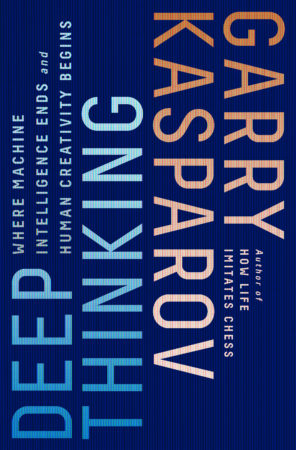

by Garry Kasparov
Former world chess champion Garry Kasparov on the overblown fears about AI
We’re not being replaced by AI. We’re being promoted.
My chess loss in 1997 to IBM supercomputer Deep Blue was a victory for its human creators and mankind, not triumph of machine over man. In the same way, machine-generated insight adds to ours, extending our intelligence the way a telescope extends our vision. We aren’t close to creating machines that think for themselves, with the awareness and self-determination that implies. Our machines are still entirely dependent on us to define every aspect of their capabilities and purpose, even as they master increasingly sophisticated tasks.
Our outdated vocabulary stokes our fears. “Artificial intelligence” sounds like an unnatural rival of our own, as an artificial sweetener is to sugar. We should instead think of AI as “augmented intelligence.” Our increasingly intelligent machines are making us smarter, just as our past technology—from pulleys to hydraulics, and sailing ships to rocket ships—made us stronger and faster. For the first time, machines aren’t just giving us answers more quickly and accurately. They are generating new knowledge that helps us better understand the world. Imagine a chess program with the potential to trounce human opponents and explain its moves to us, revealing the patterns that turn knowledge into practical wisdom, like a father teaching chess to his daughter or son.
That day may be close at hand. In December, Demis Hassabis at DeepMind, an artificial-intelligence unit of Google parent Alphabet Inc., unveiled his latest chess program, the first of its kind. The project, called AlphaZero, is a generic machine-learning algorithm with no chess knowledge beyond the rules. After playing against itself for several hours, AlphaZero crushed one of the world’s strongest traditional programs, which, like every other successful chess program in history, had been programmed with existing human knowledge of how best to play the game.
AlphaZero’s domination was produced with no opening library of moves, no human input about the relative value of the pieces—nothing at all. This unique creation generated its own knowledge to become the strongest chess-playing entity in history; human experience would have held it back. For decades, better programming and processors led to incremental improvements in AI. AlphaZero was a sudden leap—the sort we should expect to see more of as machine-learning models move into disciplines like cancer screenings, asset management, law enforcement and education, to name a few. With only minor exaggeration, in four hours AlphaZero taught itself all the chess knowledge—and more—that computer science had long assumed would come from human masters.
Whenever there’s a brilliant advance in robotics or machine intelligence, people send it to me on social media with messages proclaiming, “We’re all doomed!” But the notion that these machines could become human-hunting Terminators is absurd. Intelligence and autonomy of movement don’t equal free will and killer instinct.
So please stop fretting. Technology is the reason most of us are alive to complain about technology. Be concerned about how humans might abuse new tech, because humans still have a monopoly on the capacity for evil. But quailing about awesome robots is like refusing to get into a car without a driver or an elevator without an operator.
Garry Kasparov is the author of “Deep Thinking: Where Machine Intelligence Ends and Human Creativity Begins,” a security ambassador for Avast Software and a member of the Foundation for Responsible Robotics’ executive board.


